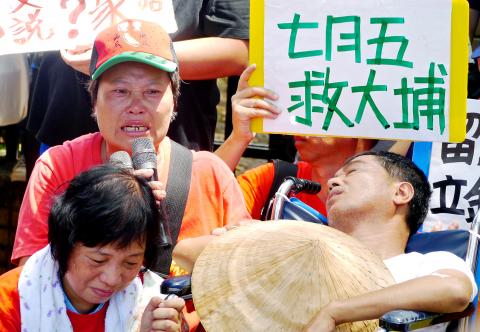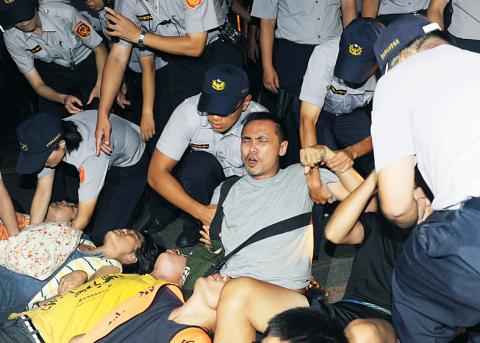Frustrated at a lack of response from Premier Jiang Yi-huah (江宜樺) over the impending demolition of the homes of four families in Dapu (大埔) in Miaoli County’s Jhunan Township (竹南), dozens of demonstrators yesterday climbed over the gates of the Executive Yuan in Taipei and clashed with police.
Meanwhile, the Presidential Office said later yesterday that Vice President Wu Den-yih (吳敦義) had asked the Miaoli County Government to suspend the planned demolition.
“If the premier is not coming out to see us, we are going in to see him,” Taiwan Rural Front spokeswoman Frida Tsai (蔡培慧) told the crowd, many of whom had been protesting outside the Executive Yuan for two days, as Jiang presided over a Cabinet meeting inside.

Photo: J. Michael Cole, Taipei Times
As Tsai led the crowd toward the front gate of the Executive Yuan while chanting “Keep your word, save the houses,” dozens of younger protesters quickly pulled out blankets, put them over the fence and climbed over into the Executive Yuan.
Several police officers rushed over to prevent the protesters from going into the Executive Yuan building, while demonstrators on the other side of the fence clashed with officers guarding the front gate.
Emotions were already running high prior to the clashes, especially after Chang Sen-wen (張森文), one of the Dapu residents whose house was scheduled for demolition by the Miaoli County Government any time after today, arrived in a wheelchair.

Photo: Lo Pei-der, Taipei Times
Chang lost consciousness early yesterday morning when he was removed by force by the police after two days of camp-in protest in front of the Executive Yuan. He fell unconscious and was still unconscious when he appeared at the demonstration at about 10:30am.
“I insisted on bringing him here, because this may be the last thing he can do for our home before it’s torn down,” Peng Hsiu-chun (彭秀春), Chang’s wife, said in tears. “Please save our home, please save my husband.”
Equally emotional was Chu Ping-kun (朱炳坤), another Dapu resident whose house is also to be demolished.
“My mother committed suicide two years ago because she was so worried about her home and land being taken over by the government. Despite promises by government officials, nothing seems to have changed,” Chu said.
“Seeing what’s happening now to Chang is like seeing what happened to my mother: My mother killed herself, but Chang could be forced into death by the government,” Chu said.
In tears and hardly able to talk, farmer Hung Hsiang (洪箱), from the neighboring township of Houlong (後龍), pleaded for help from the premier.
“I feel sad because I can’t do anything to help when a human life is disappearing in front of me,” Hung said. “A decision that you [the premier] make could save or kill a person. He [Chang] may survive today, but he would eventually die when his house is torn down. Why won’t you help save a life?”
Chang’s condition improved later yesterday afternoon and he returned home as the families and their supporters prepared for a rally in Dapu today.
Twenty-four houses were originally to be flattened to make way for a science park.
However, following fierce protests, the government agreed to allow residents to keep their homes following a negotiation presided over by Wu in 2010 when he was the premier.
However, the decision was overturned by the Ministry of the Interior and, while an administrative lawsuit is ongoing, four of the families received a new demolition order from the county government last month, asking them to tear down their own homes by today.
Meanwhile, the Presidential Office said Wu had called Miaoli County Commissioner Liu Cheng-hung (劉政鴻) yesterday morning and instructed him to suspend the demolition of the four houses scheduled for today, amid intense protests from local residents and their advocates.
Liu said the county government was not planning to demolish the houses today and that the deadline was for the four households to relocate.
He said the county government would handle the case in accordance with the law, and promised to continue to communicate with residents.
The Presidential Office said President Ma Ying-jeou (馬英九) is concerned about the case and expects government agencies to resolve the dispute.
Jiang, who on Wednesday seemed to favor the Miaoli Country Government’s demolition plan, did not comment on the issue at the Cabinet meeting yesterday.
Executive Yuan spokesperson Cheng Li-wun (鄭麗文) said Jiang took the issue very seriously and called on officials at the Ministry of the Interior and the Construction and Planning Agency to brief him about the matter after the Cabinet meeting.
Responding to a reporter’s question, Cheng said it was “too early to tell” whether Wu had broken his promise as the activists alleged.
Wu’s mediation of the case three years ago brought a satisfactory solution to the dispute between the Miaoli County Government and 20 households, Cheng said.
However, regulatory authorities later found it difficult to proceed because the four remaining houses stand in the way of traffic, Cheng said.
Later yesterday afternoon, Jiang said there was still “room for negotiation” to resolve the dispute over how to carry out the road projects involving the four houses, after Wu talked to him and Liu by telephone.
Wu has scheduled a meeting with Liu and him today on the issue, Jiang said, adding that he was hopeful for “better results” after the meeting.
Additional reporting by Shih Hsiu-chuan and Mo Yan-chih

DAREDEVIL: Honnold said it had always been a dream of his to climb Taipei 101, while a Netflix producer said the skyscraper was ‘a real icon of this country’ US climber Alex Honnold yesterday took on Taiwan’s tallest building, becoming the first person to scale Taipei 101 without a rope, harness or safety net. Hundreds of spectators gathered at the base of the 101-story skyscraper to watch Honnold, 40, embark on his daredevil feat, which was also broadcast live on Netflix. Dressed in a red T-shirt and yellow custom-made climbing shoes, Honnold swiftly moved up the southeast face of the glass and steel building. At one point, he stepped onto a platform midway up to wave down at fans and onlookers who were taking photos. People watching from inside

A Vietnamese migrant worker yesterday won NT$12 million (US$379,627) on a Lunar New Year scratch card in Kaohsiung as part of Taiwan Lottery Co’s (台灣彩券) “NT$12 Million Grand Fortune” (1200萬大吉利) game. The man was the first top-prize winner of the new game launched on Jan. 6 to mark the Lunar New Year. Three Vietnamese migrant workers visited a Taiwan Lottery shop on Xinyue Street in Kaohsiung’s Gangshan District (崗山), a store representative said. The player bought multiple tickets and, after winning nothing, held the final lottery ticket in one hand and rubbed the store’s statue of the Maitreya Buddha’s belly with the other,

‘NATO-PLUS’: ‘Our strategic partners in the Indo-Pacific are facing increasing aggression by the Chinese Communist Party,’ US Representative Rob Wittman said The US House of Representatives on Monday released its version of the Consolidated Appropriations Act, which includes US$1.15 billion to support security cooperation with Taiwan. The omnibus act, covering US$1.2 trillion of spending, allocates US$1 billion for the Taiwan Security Cooperation Initiative, as well as US$150 million for the replacement of defense articles and reimbursement of defense services provided to Taiwan. The fund allocations were based on the US National Defense Authorization Act for fiscal 2026 that was passed by the US Congress last month and authorized up to US$1 billion to the US Defense Security Cooperation Agency in support of the

‘COMMITTED TO DETERRENCE’: Washington would stand by its allies, but it can only help as much as countries help themselves, Raymond Greene said The US is committed to deterrence in the first island chain, but it should not bear the burden alone, as “freedom is not free,” American Institute in Taiwan Director Raymond Greene said in a speech at the Institute for National Defense and Security Research’s “Strengthening Resilience: Defense as the Engine of Development” seminar in Taipei yesterday. In the speech, titled “Investing Together and a Secure and Prosperous Future,” Greene highlighted the contributions of US President Donald Trump’s administration to Taiwan’s defense efforts, including the establishment of supply chains for drones and autonomous systems, offers of security assistance and the expansion of